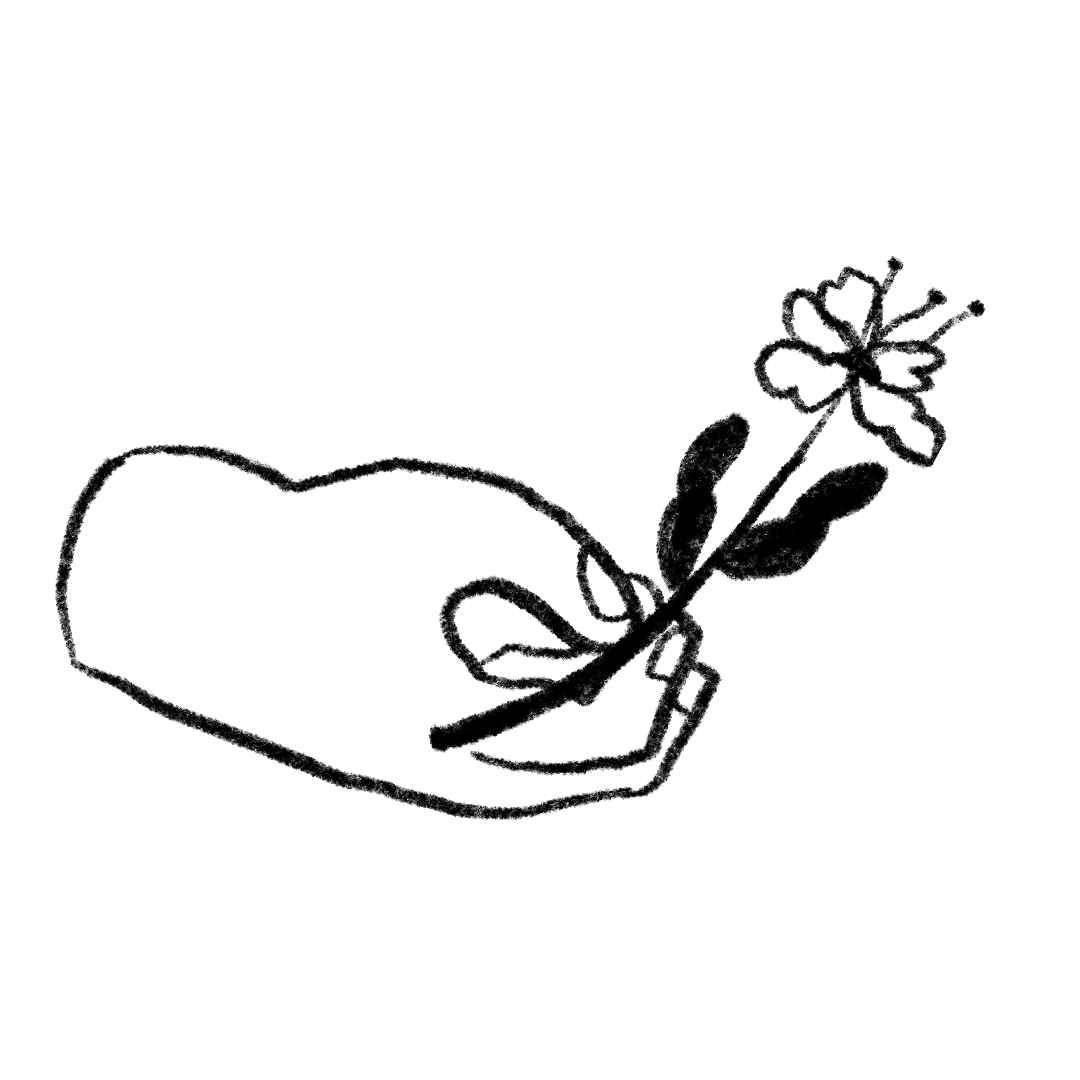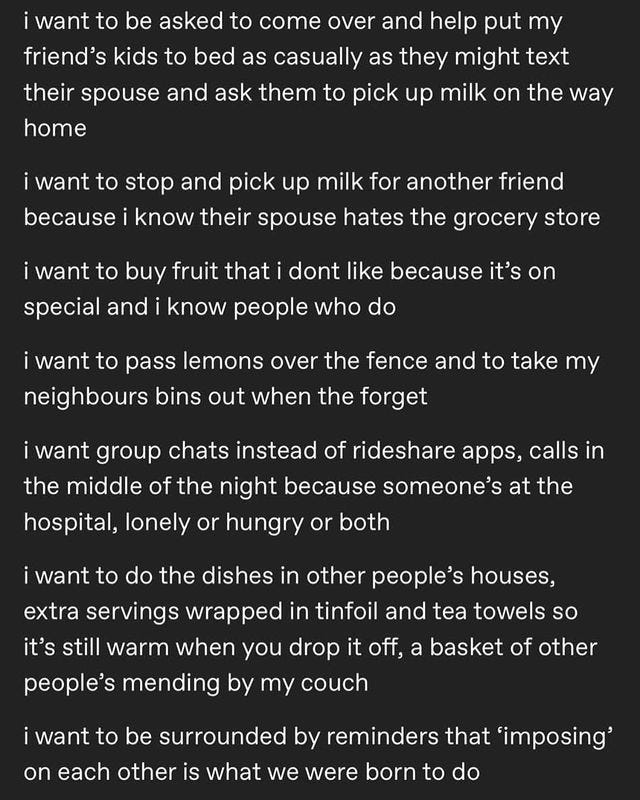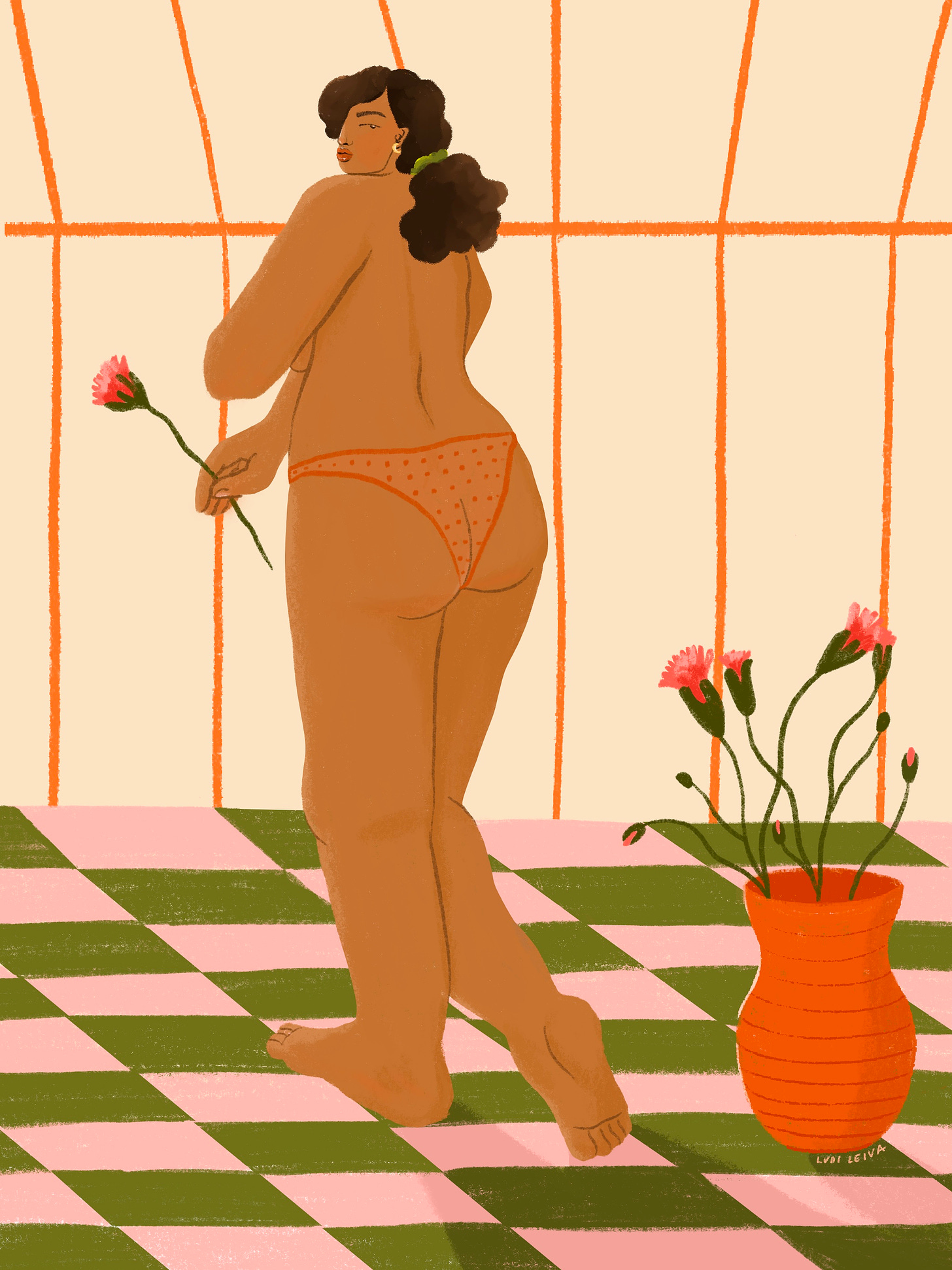Communal care loops ꩜
How can we cultivate connection, closeness, and care in a culture that wants us to live as a collection of single, separate units?
Field Notes on Flourishing is a free monthly love letter exploring art, mindfulness, creativity, and the question of flourishing — by Ludi Leiva.
Time of writing: Friday, October 28, 2022 13:00 CEST
Physical Environment: Clouds. Northeast winds. 13° C/ 55° F
Sounds: Duke Ellington is playing on the stereo.
When my mother was young, growing up in 1960s Guatemala City, her entire community was a solid unit. Children would roam freely between houses, fed by adults in the neighborhood, running down the street to the corner store to get dulces (sweets) and small glass bottles of Coca-Cola. When someone was ill, neighbors and friends would step in to help pick up the responsibilities they could no longer carry. My mother and her best friend would run across the houses’ metal roofs, playing pranks on their neighbors. Everyone knew everybody else. They were there for each other. They kept each other safe.
Thinking about a world like one this makes me sad because I know it is nothing like the world I currently live in.
My mother was raised in a collectivist society, but I was raised in an individualist one. Growing up in the US, I was socialized to believe what Western capitalist individualism peddled: that I could—and should—do it on my own. I learned to swallow my needs and “just deal with it” (to be sure, some of this was also the product of female socialization). Though my parents strived to counteract these learnings, they penetrated my psyche anyway. I was tacitly taught by the world around me that the trajectory of my life—my work, my well-being, my healing, my joy—was my responsibility alone.
I currently live in Scandinavia and often discuss with my partner, who is Swedish, the ways in which American and Scandinavian cultures differ. There are things I notice on a daily basis: the lack of eye contact from people on the street, the aversion to small talk, the avoidance of conflict or heated exchanges, and the strong emphasis on individual family units and small, iron-clad social groups. (I have my theories about how Scandinavia’s robust state-funded social welfare systems, which aim to ensure that basic needs are met, may also cause individuals to sometimes forget that they also have a personal responsibility for the wellbeing of those in their communities. But that’s a conversation for another day).
Of course, as an immigrant in a new place I have a heightened awareness of my surroundings and my lack of a deeply-rooted community is very apparent.
I get homesick often and find myself missing silly things like strangers talking to me in the grocery checkout line, or the ease by which I could meet a new friend in almost any situation. I miss the general friendliness of the American people. But these discussions have also reminded me that the exchanging of niceties does not equate to closeness, and that friendliness doesn’t necessarily mean the existence of communal care and support. I realize now that Western individualism comes in many different forms and that in almost all of them there is a lack of and subsequent longing for connection, closeness, and communal care.
“These discussions have also reminded me that the exchanging of niceties does not equate to closeness, and that friendliness between two or more people doesn’t necessarily mean the presence of communal care and support.”
Three years of social and legal restrictions, habituation, and fear spurred by the pandemic has pushed us deeper into individual siloes. But in an attempt to keep ourselves physically healthy, we have simultaneously caused ourselves deep emotional and psychological harm. According to a 2021 Harvard report, 61% of young adults, 51% of mothers with young children, and 36% of all Americans feel "serious loneliness,” figures which have significantly and gradually increased since the onset of the pandemic. Bottom line: the model that we’ve adhered to thus far is not working, and the pandemic has only made this more apparent.
The truth is what it always has been: we are all deeply and intrinsically linked to each other. We are social creatures, built and hard-wired to commune with those around us. Our joy, our health, our well-being, our peace of mind—they are all connected. And we must strive to build a world that better reflects this reality.
As we find our way forward from here, collectively stumbling in the half-light in search of brighter possibility, I find myself asking a lot of questions: How can we build the communities we want to live in? How can we fill the gaps between ourselves and others with love, empathy, and presence? How can we cultivate connection, closeness, and care in a culture that wants us to live as a collection of single, separate units? How can we be loving drops that create ripples in our neighborhoods, our friendships, and our communities? What does it look like to be in a communal care loop?
I do not yet know the answers to these questions, but I do have some ideas (see brainstorm below).

While talking to my therapist this week, we discussed these topics at length. As I lamented much of the aforementioned, she gently said to me: “Remember, it’s your job to carve out the community you want to live in.” And she is right. As we head towards the darker, slower months of winter, I intend to enact the things that I myself long for—to be the friend, community member, partner, neighbor, etc that I myself need.
I want to send that impromptu dinner invitation to a friend who’s going through a breakup. I want to bake cookies to share with others, to help my elderly neighbor carry in her groceries. I want to send my long-distance friends a postcard to tell them I’m thinking of them. I want to give of myself, do acts of service without a thought to what it might get me back, and be fully and deeply present with others.
This, I think, is how to start a communal care loop. And I invite you to think about what it would look like for you to start one, too*.
*As I write this, I’m reminded of the Moiré effect, a mathematical phenomenon in which a set of concentric circles overlap each other (see figure below). I envision a communal care loop to emanate outward, like a ripple. What would happen if many of us set out with the intention of creating our own version of communal care loops in our communities? What would it look like when they inevitably intersect?

Thank you for reading. I hope you’ll be kind to yourself, and to all who you meet in your path.
Communal Care Loop (brainstorm):
What would you add to this brainstorm? 👀👂🏼
Illustration work lately
I made an editorial feature illustration for The LA Times' Article on how the new Chicana and Chicano Studies Department at Cal State Fullerton is pioneering a new era of Latin American studies and cultural conservation.
I finished an abandoned sketch from 2020 to create this personal work: “Orangeriet,” a meditation on indulging in beauty, slowness, and presence.
I created the key artwork for Opera Laguna, a new community opera company In Laguna Beach, CA:
On my reading list:
Care Manual: Dreaming Care into Being kamra sadia hakim’s debut publication with Flower Press fuses praxis and theory into a blueprint for giving and receiving care in community.
Emergent Strategy: Shaping Change, Changing Worlds adrienne maree brown’s exploration of the connections between self-help, society-help, and planet-help and how to shape the futures we want to live.
Care Work: Dreaming Disability Justice a beautiful collection of essays by Leah Lakshmi Piepzna-Samarasinha exploring the politics and realities of disability justice
We Will Not Cancel Us: And Other Dreams of Transformative Justice another adrienne maree brown book that reframes discussions around cancel and call-out culture and envisions a new way forward without recreating patterns of harm.
I encourage you to borrow books from your local library or purchase from a local bookstore instead of Amazon.
Sending you a virtual hug ✨
Your being here supports my art and writing practice and means the world to me, thank you.
This newsletter is free because I want it to be accessible to everyone. But if you feel like it, you can become a paid subscriber for the price of about one or two lattes a month—or buy me a tea or coffee via Venmo or Paypal ☕️












This is so true, so painfully deep and so meaningful that leaves me with so much I would like to say but no words are found. Thank you
profound, meaningful meaning. Especially in these days. Thank you!